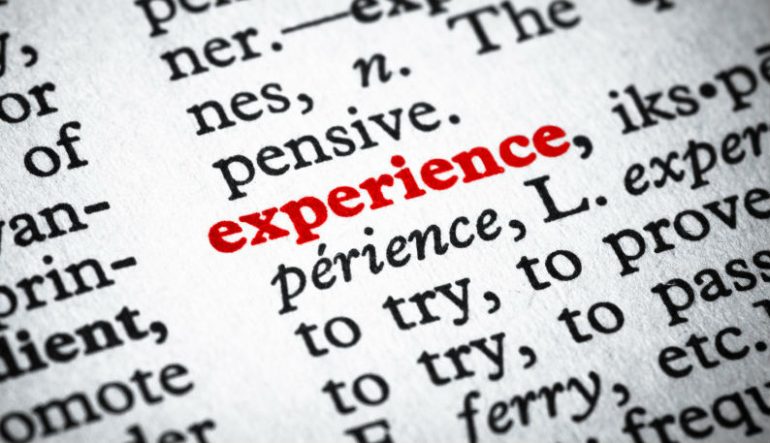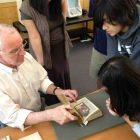The Ploughshares Round-Down: Why You Should Plan Experiences

It’s mid-October, and some of us are gearing up for NaNoWriMo, or NaNonWriMo. Some of us are just inspired by the changing seasons, and want to finally try some new thing we keep putting off. Or maybe we just want to actually read one of the books stacked on our nightstands.
Unfortunately, we writers humans have an endearing habit of envisioning grand creative plans, only to throw them out for the sake of some suddenly-urgent busywork. (Or Halloween candy binge). We also tend to distract our imaginations with things we want or need, hoping accumulation will make us happier, healthier, and/or more productive. So I was happy to come across James Hamblin’s “Buy Experiences, Not Things” piece in The Atlantic, which describes psychological studies showing not only “that experiences bring people more happiness than do possessions,” but also that “spending money on experiences ‘provide[s] more enduring happiness'” than spending money on material possessions. Why? As it turns out, humans are happiest when we’re “living in the moment.” That phrase is cliche enough to make me feel queasy typing it here, but seriously–
the achievement of the human brain to contemplate events past and future at great, tedious length has, these psychologists believe, come at the expense of happiness. Minds tend to wander to dark, not whimsical, places.
In other words, the fact that we’re able to contemplate vastly more than the present moment doesn’t mean that doing so is (always) in our best interest. We’re still happiest when we stay with where/who/how we are in the now.
Nevertheless, I don’t imagine throngs of us signing up to learn meditation or to commit ourselves to plan-less, brood-free lives. So here’s what caught my attention: Psychological studies show that when you CAN’T live in the moment, it’s best to live in anticipation of an experience.
Waiting for an experience apparently elicits more happiness and excitement than waiting for a material good . . . By contrast, waiting for a possession is more likely fraught with impatience than anticipation.
There are several reasons for this: we’re less likely to compare our experiences with others’, which means we’re less distracted by how and whether we “measure up.” Experiential purchases are also “more associated with identity, connection, and social behavior” than material purchases. And while it may be exciting to anticipate a material possession for a while, we’re too good at adapting to owning it; the pleasure soon wears off. This isn’t (as) true with experiences.
So okay. Experiences are apparently good. They’re worth our money and time, even if it means putting off an upgrade or New Cool Thing. But what’s the takeaway for Ploughshares readers and/or our looming creative plans?
1. Studies show again and again that an increase in experiences leads to an increase in creativity.
Researchers have shown that people who have high creative output have a “tendency to initiate numerous activities that lead to, or provoke, rich external stimulation,” and that “richness of input creates a corresponding richness of output.” In addition, “unusual and unexpected events” trigger creativity, and diverse experiences allow us to make more and better connections between disparate objects and ideas, which leads to imaginative combinations. Add this to Hamblin’s writeup in The Atlantic, and we see that investing time, thought, and money into experiences may lead not only to increased creativity but also increased happiness and contentment. This sounds like a win-win-win.
2. Reading fiction, poetry, or other literatures is undeniably an experience.
When reading, there’s generally a sense of going somewhere and coming back, or at least of something having happened in or to us. This is what many of us go to literature for. On the other hand, it’s not often that we anticipate reading as an experience in the same way we might dwell on an upcoming vacation or special date. This means we don’t make time for it, and it takes forever to get around to the list of books we want to read.
We also don’t often have ready means of reflecting back on literature: remembering how it felt to be absorbed in it. For instance, we don’t have pictures of the experience, and few people are asking us, “So how was your time in Jude the Obscure?” If we’re lucky, we can talk about a novel with someone else who’s recently read it, or we can post what we’re reading on social media and hear from friends who have questions or comments about it. But for as experiential as we know literature is, it actually takes some work to make it operate in our lives the way other sensory experiences do.
So how might we change this up? Consider how you might turn reading into something anticipated, planned, shared, and (socially) remembered.
3. Don’t be afraid to make your writing into an experience–as opposed to (merely) a job or necessary undertaking.
This is the advantage of taking on NaNoWriMo, rather than simply setting out to write a novel: The participation of many other writers, the definitive time-frame, the exhausting challenge of it–all of this helps writers view their undertaking as an experience that they can both anticipate and remember. This doesn’t mean it’s easy, or that writers are happy the entire time. It does mean they’re more likely (and able) to reframe any difficulties as meaningful aspects of a significant experience.
How might your writing work take on more of this experiential feel? How might you design your writing time, space, and/or discussions in order to make writing more of a singular experience you can look forward to, and reflect upon later?
4. Experience isn’t (necessarily) stimulation.
Although experiences can lead to increased creativity and happiness, resist the temptation to equate experience with stimulation. Bouts of social/internet disconnection and imaginative down-time are essential for the “aha moments” and unconscious creativity that lead to great art. So although it may seem like all of that newsfeed-browsing and status-updating are experiences, unless you’re planning them, looking forward to them, and then remembering them fondly, they don’t count. In contrast, the times you set aside for disconnected, meditative, news-free thinking are anticipatable, memorable experiences–and they may prove vastly more productive.
In short . . .
The goal of tuning in to this kind of “happiness-research” isn’t to achieve some naive or selfish happiness, or to mask the very difficulties about which many of us choose to write. The goal is to come to terms with our tendency to mind-wander and day dream, and to experiment with how we might use this to our advantage: for increased creativity and increased happiness.
So if you need it, here’s your kick in the pants to go experience something this week: Have a long, drawn out conversation; try a different restaurant; take a strange route to work; meditate; read something new; see a performance; set aside substantial time to disconnect from WiFi; make something with your hands.



